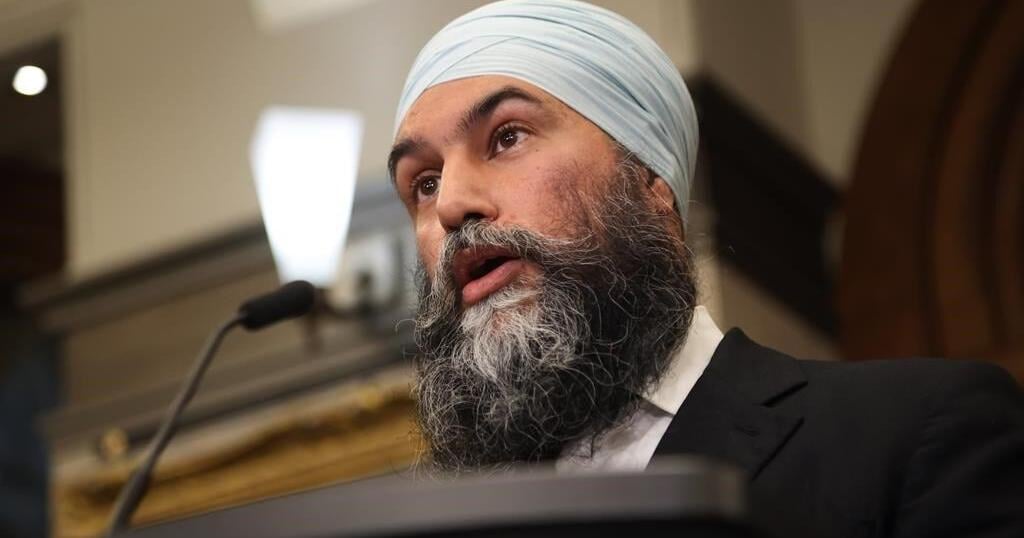OTTAWA – NDP Leader Jagmeet Singh has “ripped up” the supply and confidence deal with the Liberals that helped keep the minority government in power.
“The deal is done,” Singh tweeted, early Wednesday afternoon.
In a video posted Wednesday afternoon, Singh said he notified Prime Minister Justin Trudeau of the decision.
“Canadians are fighting a battle. A battle for the future of the middle class. Justin Trudeau has proven again and again he will always cave to corporate greed,” Singh said in the video directly addressing Canadians.
“The Liberals have let people down. They don’t deserve another chance from Canadians.”
Trudeau said Wednesday he’s focused on affordability, housing and the impacts of climate change, not politics.
“I really hope the NDP stays focused on how we can deliver for Canadians, as we have over the past years, rather than focusing on politics,” Trudeau said at a press conference in Newfoundland and Labrador.
Singh and Trudeau reached the agreement in March 2022, committing the Liberals to implement several NDP priorities such as dental care and pharmacare in exchange for the NDP caucus supporting the Liberals on key votes like budgets.
Singh did not take questions Wednesday, and is expected to hold a press conference Thursday.
The decision doesn’t mean the government automatically falls at the next confidence vote. Rather, the NDP will determine how to vote on Liberal legislation on a case-by-case basis.
Singh said there is another “bigger battle ahead,” noting the threat of cuts from the Conservatives under their leader Pierre Poilievre if the party wins the next election.
“The fact is, the Liberals are too weak, too selfish and too beholden to corporate interests to fight for people. They cannot be change, they cannot restore the hope, they cannot stop the Conservatives,” he said.
“But we can.”
He said in the next election Canadians will have to choose between Conservative cuts or hope that the country stands united.
He announced his decision less than a week after Poilievre wrote to his NDP counterpart to demand Singh pull his support for the Liberals and force an election this fall.
National opinion polls suggest Poilievre’s stance on workers’ rights and the economy is resonating with Canadians. He continues to hold a substantial lead ahead of Liberals and New Democrats.
Poilievre called Singh’s decision a “media stunt” in a statement on social media Wednesday.
“Sellout Singh refuses to state whether the NDP will vote with non-confidence to cause a carbon tax election at the first chance,” Poilievre wrote on X Wednesday.
New Democrats say Singh asked the party to start building an exit plan in the early summer, and decided to pull the plug by mid-August.
The party says Singh had already filmed the video to announce he was leaving the deal before Aug. 29, the day Poilievre held a press conference calling for Singh to break the deal.
Last week Singh called the Liberals’ move to force binding arbitration to end contract disputes at the country’s railways a “line in the sand that was crossed.”
However Singh had begun re-examining the deal weeks before Aug. 22, when Labour Minister Steve MacKinnon asked the Canada Industrial Relations Board to impose binding arbitration to end a work stoppage at Canadian Pacific Kansas City and Canadian National Railway that paralyzed Canada’s transportation networks.
The request came just 24 hours after the two companies locked out their workers after failing to reach a contract deal at the bargaining table.
NDP’s labour critic Matthew Green told The Canadian Press earlier this week that as Canada’s only labour party the NDP has a responsibility to take “bold steps” to ensure there’s support for workers and their families, and others who are “struggling in this economy.”
Singh said Wednesday his party will deliver hope and relief, fix health care, build homes and stop price gouging.
Many of the affordability measures the Liberals have brought in over recent years, including dental-care benefits, one-time rental supplements for low-income tenants and a temporary doubling of the GST rebate, were NDP priorities. Some came about as a result of the deal.
In addition to dental and pharmacare programs, the New Democrats also used their deal with the Liberals to push forward a ban on replacement workers during a strike or lockout at federally regulated workplaces.
The two parties also negotiated a housing accelerator fund that allocated billions of dollars to help build more than 750,000 homes across Canada.
House Leader Karina Gould said Aug. 26 that she expected the deal to run until its end, which was to be June 2025. Her office reiterated those remarks Tuesday.
This report by The Canadian Press was first published Sept. 4, 2024.

























